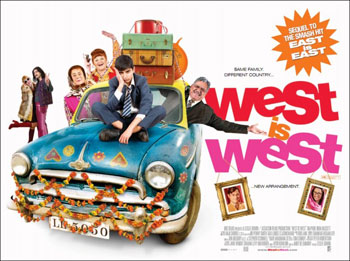LFF: West Is West – 3*
 East Is East (1999) was a breath of British comedy fresh air, a playful and broad-minded but poignantly comical look at the issues of integrating Pakistani culture in 1970s’ Britain, as portrayed through the lives of one Anglo-Pakistani family based in Salford, Greater Manchester. It had tears, laughter and frustrations, triggered through a series of everyday clashes and compromises, as experienced by the different generations of the Khan family. Over 10 years on, the same talented writer, Ayub Khan-Din, gives us the sequel, West Is West, that begins a heartfelt ‘coming-of-age’ journey in Salford, ending in the homelands of an ‘idyllic’, almost nostalgic, latter-day Pakistan for the Khan family.
East Is East (1999) was a breath of British comedy fresh air, a playful and broad-minded but poignantly comical look at the issues of integrating Pakistani culture in 1970s’ Britain, as portrayed through the lives of one Anglo-Pakistani family based in Salford, Greater Manchester. It had tears, laughter and frustrations, triggered through a series of everyday clashes and compromises, as experienced by the different generations of the Khan family. Over 10 years on, the same talented writer, Ayub Khan-Din, gives us the sequel, West Is West, that begins a heartfelt ‘coming-of-age’ journey in Salford, ending in the homelands of an ‘idyllic’, almost nostalgic, latter-day Pakistan for the Khan family.
Thankfully, for Khan-Din to rework his magic, the majority of the Khan clan has returned to give the same memorable performances as before, including Om Puri as ‘bloody’ foul-mouthed Pakistani patriarch George, and Linda Bassett as his strong and opinionated but fiercely loyal English wife Ella. The latter is sorely missed throughout most of this film, though, until she appears in Pakistan, sticking out like a sore thumb with uncouth Auntie Annie (Lesley Nicol) in their unsuitable Western attire, to confront a long-absent George. And ‘Khan sons’, actors Emil Marwa and Jimi Mistry make appearances – if only for a brief moment in Mistry’s case to establish Tariq’s running a shop in Manchester, having escaped the clutches of his father’s cultural impositions. Meanwhile, Marwa as traditional and obedient Maneer who plays a bigger part this time attempts to find (preferably) a Nana Mouskouri-lookalike bride in Pakistan but comes up against new prejudices that even George didn’t envisage for.
The newest member of the cast is acting novice and surprise emerging talent Aqib Khan as Parker-less Sajid, George’s youngest, now teenage son. Khan and Puri have an incredibly genuine father-son relationship at play, which helps drive the latest film and keeps the fantasy moments grounded. It’s Sajid’s racial bullying troubles as school, and his subsequent dallying in shoplifting that kick-start the trip to Pakistan. A worried George plans to instil a sense of heritage and good morals in the boy. What occurs is nothing short of enlightenment for George and Sajid – even if it does take a helping hand from a wise old crone who acts like a surrogate father to the kid. This change suggests that a spot of escaping the Western rat race will solve all personal problems is like looking through rose-tinted spectacles, and smacks of a Khan-Din chimera played out on screen, when we all know some of the serious problems the nation faces in reality.
Andy DeEmmony who succeeds Damien O’Donnell as the director on the latest film does a commendable job of recreating the same entertaining scenarios and challenging relationship encounters. Although this film injects a colourful life of its own that’s in dramatic contrast to the grey locations of the first, it does verge on the farcical, like Carry On Laughing Up The Punjab at times, plus it lacks the uniqueness of the first. Unsurprisingly, there’s a prime excuse for more gaiety and Asian caricatures, too, with the inevitable wedding and Bhangra dancing beats.
That said one of the most memorable moments of the film is when Ella meets and bonds in a moment of despair with the first Mrs Khan, Basheera, played by the infamous Ila Arun, in what transpires as a deeply personal reveal. The all-consuming presence and talents of both actresses is highly apparent, especially as in that scene, neither one speaks the other one’s language.
West Is West will be more of a culture shock for those with fond memories of the first film, as those of non-Asian ethnicity are taken back to the Khan’s homestead, and attempt to understand values that George holds dear to his heart. It certainly explains his pride and the turmoil such an inter-racial family faces. Primarily, it raises and addresses that deep-seated desire engrained in of us all: the sense of belonging and need for identity, without which we fail to really understand ourselves.
3/5 stars
By @FilmGazer